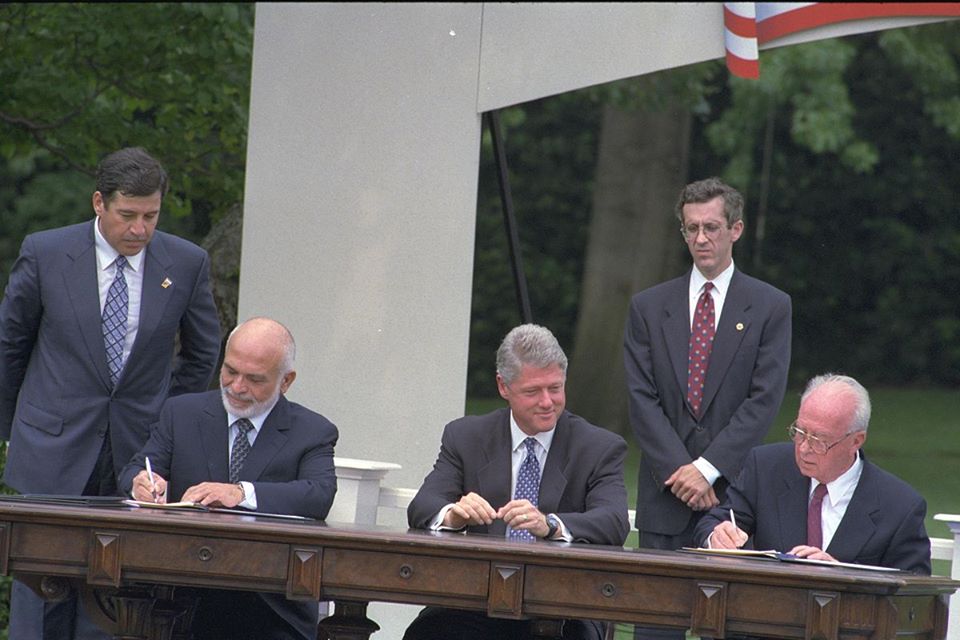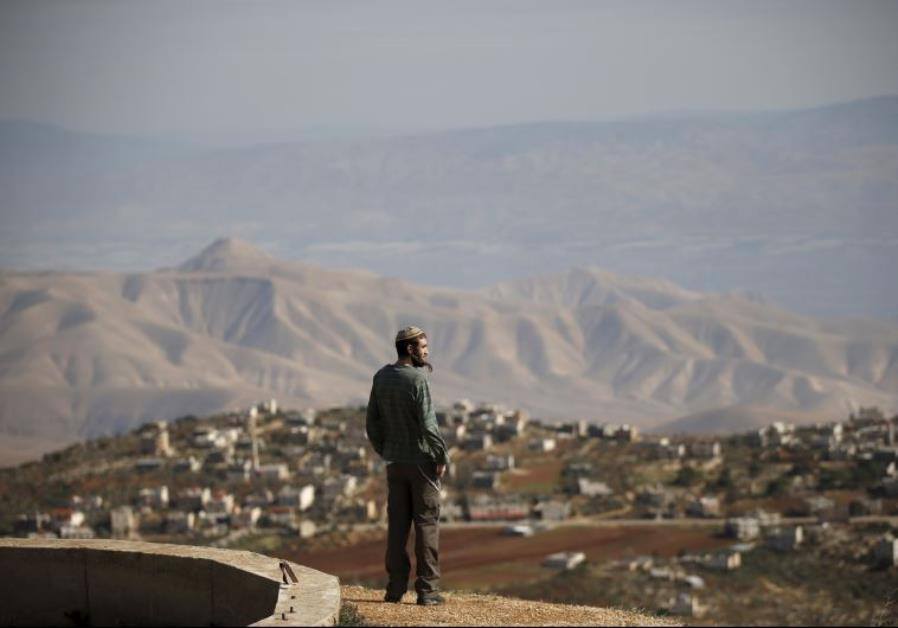The Strategic Importance of Judea and Samaria: Interview with YORAM ETTINGER
By
Posted on August 4, 2017

Among the most well-informed analysts of the Arab-Israeli conflict and Middle Eastern scenarios, Yoram Ettinger belongs to the brave school of great realists, scholars and political thinkers who never defy from looking at things as they are and not as they would like them to be. Reality is out there, and it is often difficult to deal with, but nothing is worse than projecting on it false assumptions and imaginative schemes, for reality always commits to reject them hard. Former Ambassador Ettinger (who is already representing the Congressional Relations with the Israeli Embassy in Washington) does not run this risk as well as anyone who reads The Ettinger Report online .
The informal met him in Jerusalem
Ambassador Ettinger, in an article she published for Israel Hayom on 17 July, writes, "The politically correct subordinated reality of the Middle East and the long-term national security in the Holy Grail of a peaceful coexistence between Jews and Arabs west of Jordan ". Is not this a distinction between reality as it is and reality as one would like it to be, essential to understanding the Arab-Israeli conflict?
Short-term convenience on the one hand, and long-term national interest or security on the other, is a historic division between human beings regardless of Israel and the Arab-Israeli conflict. It has also influenced and undermined the attitude towards the conflict and as a result it has only added more gas to the fire than to reduce or extinguish it. One of the proofs of this is that since 1948 there has been a litany of attempts by western politicians, mainly Americans but also Europeans to resolve the Arab-Israeli conflict, the Palestinian question, but none of these attempts were successful. The only two successful attempts so far successful, which have resulted in the peace treaties between Israel and Egypt and Israel and Jordan, have been the product of initiatives by the Israelis who have negotiated directly with the Arabs without Western brokers. When it comes to the Palestinian issue and the Arab-Israeli conflict, the focal point is not to increase the successes of Israelis or Arabs, but Western interest in the long run. Will the question be, regardless of Israel's interest, whether a Palestinian state would benefit or disadvantage western interests in general? My view is that anyone examining the issue in this sense will come to the conclusion that appealing to political correctness, in other words to the emergence of a Palestinian state to the west of Jordan, would only undermine Western interests.
Recently, UNESCO has designated the Tomb of Patriarchs in Hebron as a Palestinian site. Formerly he produced another document in which the Temple Mount, the most sacred site for Jews, was defined by the Arabic name of Haram al Sharif, the Noble Shrine. In the past Yasser Arafat denied the existence of the temple in Jerusalem. What is UNESCO doing does not sound like a clear cultural war against Israel by the Arabs and Islamic countries that hold the majority in the organization with the aim of eradicating Jewish history from the Middle East?
This is another attempt to recreate the Middle East in accordance with the Arab project and with an extremely simplified European approach to the Arab-Israeli conflict. The European premise is that it is possible to resolve the conflict in accordance with Arab demands. This approach first ignores reality, and the reality is that the foundations of Jewish history, Jewish religion, Jewish nationalism are in the mountainous regions of Judea and Samaria, commonly known as the West Bank. The supporting column of Judaism is not Tel Aviv, it is not Haifa or no high altitude along the coast, but it is in the mountains of Judea and Samaria. Obviously this complicates the question, but the challenge is to face reality rather than to recreate it. The challenge is to subordinate our points of view to reality instead of deforming reality so that it coincides with our simplistic points of view on the Middle East. When it comes to making concessions to the Arabs, whether it be UNESCO or UNRWA or the United Nations in general, or whether it is any European government, it is necessary to learn from historical precedents. Whenever a rogue regime is to be reconciled, it is an Arab, Iranian or North Korean regime that only stimulates its appetite. It's like a person who is attacked by a shark in the ocean and thinks the shark will be happy with a bite and then it will go away. Despite short-term disadvantages of resisting rogue regimes, there is no doubt that this favors the long-term interests of Western governments.
This brings us back to the option of a Palestinian state west of Jordan, the favorite of Western governments.
This assumption is based on the idea that giving concessions to the Palestinians by granting them sovereignty to the west of the Jordan would diminish the flames of the Middle East. The opposite is true. Should there be a Palestinian state in the mountains of Judea and Samaria, it would provide an incentive to the current attempts to overthrow the Hashemite regime east of the Jordan. Turning back to the signing of the peace treaty between Israel and Jordan, General Dan Shomron, then the IDF Chief of Staff, told me that at that time he had been approached by his Jordanian colleagues who had begged him not to go the end of establishing a Palestinian state west of the Jordan because its coming into being would devastate the Hashemite regime east of the river. In fact, General Yaalon, who at the time was the head of military intelligence, was also approached by his Jordanian colleagues who asked him if Israel was aware that what had been signed by Palestinians in the morning would have been violated in the afternoon. This was based on the experience of hashemites with Palestinians east of Jordan. The moral is that hashemites are the worst male in the Middle East. That is to say, a Palestinian state could trigger a rebound effect that could devastate Western interests in accordance with Western pro-Arab regimes on the Arab peninsula and Jordan. Their Iranian, or Russian control, or Chinese would devour the Western economy and the stability of the oil market in the world and certainly exacerbate the issue of Middle Eastern terrorism with consequences that would affect Europe, the United States and South America. A Palestinian state would mean a naval or aerial Russian base inside it, and possibly an Iranian military base that would dramatically disrupt the current balance of powers in the Mediterranean, already the soft belly of Europe. It would also mean the devastation of what remains of the Christian centers of Judea and Samaria. Bethlehem and Bet Jalla were once Christian majority centers until the 1993 Oslo Accords. Since then, they have fallen to tiny minorities, less than 20% in Bethlehem and the same percentage to Bet Jalla.

In 1993, Shimon Peres, Yitzhak Rabin and Yossi Beilin returned to the center of the scene an Arafat fallen into disgrace (after his support for the Iraqi invasion of Kuwait). The result of this decision was the Oslo Accords and the full legitimization of the OLP as interlocutor. The consequence for Israel was the Second Bloody Intifada. What do you have to say about this?
There is a precedent and is the recognition of OLP by USA. It happened in December 1988 when President Reagan was at the expiration of his term of office. At that time, OLP was the largest terrorist organization in Arabia that was fought by international terrorists in Europe, Latin America, Africa and Asia. The second phase through which fuel was supplied to Arab terrorism, and thus to global terrorism, was in 1993 when, as you recalled, OLP was virtually removed from oblivion at a time when it was confined to Tunisia and some terrorist camps in Yemen, Libya and Lebanon and turned into a legitimate organization. It was still to submit to the desirable thought, to submit to the temptation to reach a short-term advantage by completely ignoring the complexity of reality and the serious consequences for national security over the medium to medium-long. The first victim of the PLO's legitimacy in 1988 and hence in 1993 was not Israel and not the Jews, but the Arabs.
This is what recently, in an interview with him, emphasized Bassem Eid . She has clearly said, as is customary, how much the Palestinians have suffered and still suffer under the government of the Palestinian Authority of Mahmoud Abbas.
I want to tell you an episode about it. A few years ago I was presented to a very respected Arab businessman here in the Jerusalem area. The first thing he told me was that the Arabs in the area would never forgive the Jews for their current situation. I thought he was talking about the so-called "occupation" and asked him if he did not think this so-called "occupation" was better than Jordan, Syrian or Egyptian occupation, and his response was amazing, "Who is talking about employment? I'm talking about the fact that you Jews have brought us the plague of PLO terrorism. They were in Tunisia, away from us, and you brought him here and basically you have done our rulers and since then things have gone rolls. "
And did she give you specific examples?
Only some indicative examples. Under Giordano's control there was no tax on income. What the Jordanians expected from the Arab-Palestinians was that they were loyal to the Hashemite crown. Under Israel, they had to pay auditors and auditors, and once a year had to deal with Israeli taxes on income taxes and pay taxes. When OLP came, they had to face an unprecedented reality. The junkies went to this businessman to ask him two hundred thousand shekel, or what they wanted. If you asked for a piece of support for this request you were told that you had the choice to be accused of being a Zionist collaborator or paying what was required. If it happened to be married to an avid woman or fathers of a dainty daughter, every now and then was approached by a high-ranking officer of the Palestinian Authority who could either wish either. Once again, it was the choice, or it was tolerated that his wife or daughter was abused or faced with the possibility of being accused of being collaborators and being executed on the public square. Not to mention corruption. There is a reason why Mahmoud Abbas is nicknamed Mr. 20%. Within the Palestinian Authority everyone knows that an international businessman who wants to see if there are business opportunities with the Palestinian Authority must, first and foremost. meet with Abbas and then, after the meeting, agree on the payment of 20% of the amount agreed upon on one of Abbas's accounts around the world. Arafat was the initiator of this practice and Abbas continued it. Arabs in the Middle East know very well these types of reality and this is the reason why Palestinians give many words but absolutely no concrete facts.
From what he says, it is quite clear that the Arab attitude toward Mahmoud Abbas and the one held to him by Western countries is very different. The Arabs know exactly who they are, while Europeans and Americans have another idea of him. In Europe, we love to glimpse the scoundrels of the "fighters for freedom" of gunmen and terrorists. Arafat was commonly received as a star in European capitals.
While at Mahmoud Abbas is welcomed with a red carpet when he lands in Rome, London, Paris, Washington or even in Jerusalem, he is welcomed with a luscious carpet when going to any Arabian capital. The difference is that Arabs are familiar with the actions of Mahmoud Abbas since the 1950s when, together with Arafat and other members of Fatah and OLP, today the Palestinian Authority, were members of the Palestinian Brotherhood Cell in Cairo. There they were involved in acts of terror and subversion and had to escape from Egypt during the presidency of Nasser. Then Syria opened its doors to Arafat and Mahmoud Abbas and their allies, but in 1966 the Palestinians who were there felt strong enough to introduce subversion and terrorism and had to run away again. That was the turn of Jordan, where King Hussein opened their doors and Jordan was employed for a number of years between 1968 and 1970 as the main anti-Israeli terrorist platform. Since 1970, the Palestinians felt strong enough to try to overthrow the Hashemite regime. Their plan provoked a civil war in Jordan and as usual Mahmoud Abbas, Arafat and his allies had to flee. They settled in Lebanon for a number of years and then plundered and raged the south of the country until in 1975, once again strong enough to try to overthrow the central regime of Beirut. Their action forced the central regime to resort to Syria's aid. That was the beginning of the Syrian military occupation of Lebanon. where King Hussein opened their doors and Jordan was employed for a number of years between 1968 and 1970 as the main anti-Israeli terrorist platform. Since 1970, the Palestinians felt strong enough to try to overthrow the Hashemite regime. Their plan provoked a civil war in Jordan and as usual Mahmoud Abbas, Arafat and his allies had to flee. They settled in Lebanon for a number of years and then plundered and raged the south of the country until in 1975, once again strong enough to try to overthrow the central regime of Beirut. Their action forced the central regime to resort to Syria's aid. That was the beginning of the Syrian military occupation of Lebanon. where King Hussein opened their doors and Jordan was employed for a number of years between 1968 and 1970 as the main anti-Israeli terrorist platform. Since 1970, the Palestinians felt strong enough to try to overthrow the Hashemite regime. Their plan provoked a civil war in Jordan and as usual Mahmoud Abbas, Arafat and his allies had to flee. They settled in Lebanon for a number of years and then plundered and raged the south of the country until in 1975, once again strong enough to try to overthrow the central regime of Beirut. Their action forced the central regime to resort to Syria's aid. That was the beginning of the Syrian military occupation of Lebanon.
A series of remarkable primates.
It's not over. The latest intra-Arab betrayal by Mahmoud Abbas and his Palestinian comrades took place in 1990 when Saddam Hussein invaded Kuwait. Over the years, Kuwait had been the hottest Arab country for Arafat and its Palestinian allies. Kuwait had absorbed about three hundred thousand Palestinians by helping them get to high positions, but in August 1990 when Saddam Hussein invaded the country, three Palestinian bombers stationed in Iraq participated in the invasion. Palestinian intelligence in Kuwait favored the invasion and that was the reason that led Kuwait leadership to expel about three hundred thousand Palestinians. To date at the Arab League conferences, participants show their disdain towards the Palestinians leaving the room when Mahmoud Abbas stands up to speak. Gulf states do not forget and do not forgive. This clearly demonstrates the difference between the Arab attitude and the European and Western attitudes towards the Palestinian Authority and Mahmoud Abbas. And this is evident from the fact that all Arab oil producing countries put together the Palestinian Authority with less financial assistance than the one provided by the United States.
The British Mandate for Palestine of 1922 and confirmed by the League of Nations gave the Jews the right to reside anywhere in Palestine between the Jordan River and the Mediterranean Sea. However, after the Six-Day War, by virtue of the massive propaganda launched by Arabs and Russians, the word "occupation" and the expression "Occupied Territories" has become the main mode of describing the Israeli presence in those illegal the same territories as the British Mandate for Palestine had conferred Jewish efforts. Is not this a flagrant contradiction?
Not only is it a flagrant contradiction, here we are talking about the centrality of international law. Once the world has decided that the previous legal decisions taken by the international community are no longer dominant because they complicate the reality because they oblige us to do without conventional wisdom and seem to complicit the so-called peace process because someone should sign new agreements? Indeed, in 1945, when the United Nations was established, Article 80 of the United Nations was in line with the previous international treaties which accorded the Jewish state to the entire western region of the Jordan River. In 1967, when Resolution 242 was approved by the UN, it clearly stated that Israel was not obliged to fully withdraw from the territories captured during the Six Day War. There were three weeks of debates on the final formulation because the Arabs supported by the Soviets wanted to introduce the clause, "withdraw from all territories" and fortunately, in the end we realized that if there had to be a complete retirement for what reason to take the trouble to negotiate? If you meet the aggressor, whose aggression has actually caused the war, how can you expect peace in the region? From Resolution 242 to today, Israel has already returned the entire Sinai. The entire Sinai is about 90% of the entire territory controlled by Israel since the 1967 war and the question is, does the extension of this territory already meet the requirement of withdrawal from the territories? Let me add this to the 1979 Camp David's Egyptian-Israeli peace treaty signed by the United States, Egypt and Israel, there is reference to a Palestinian "administrative" autonomy. Israel has agreed to return Egypt to the whole Sinai to have the peace treaty. Once the world decides that this administrative autonomy must be neglected and instead there must be a sovereign state, can Israel ask for the restitution of the entire Sinai? Obviously you can not resume the sold territories but you can miss any verbal agreement made. The signal to Israel may be to no longer sign international commitments, because such commitments entail a territorial concession by Israel in exchange for an Arab rhetorical concession that is very easy to remarry. The conclusion is that international treaties are binding, whether they complicate reality or not, are binding, and if they are,
In a fundamental article published in 1991, Eugen W. Rostow, one of the architects of Resolution 242, wrote, "The West Bank Arabs could be a population of the autonomous province of Jordan or Israel following the course of the negotiations. This was written three years before the Oslo Accords. " Is the idea of a future integration of the Arabs of the West Bank in Jordan a more realistic and realistic option than that of the two states?
The question is what is meant by "realistic". For me, the goal should be to minimize potentially tectonic upheavals in the region. In order to minimize its volcanic nature, it should be Israel to control the mountains of Judea and Samaria. I'll give you an example. In the 1970s, Syria, then a formidable military power, invaded Jordan, a relatively weak military power. The goal was to expand Syria's support of the Soviets in what they called South Syria and from there penetrate into Saudi Arabia and inflict a strong economic and national security blow on Western interests. The United States could not assist the Jordanians in the face of the Syrian invasion, since they were involved in Vietnam, Laos and Cambodia. Nixon called Golda Meir and asked her to help Jordan in her attempt to reject the Syrian invasion. Within 24 hours Israel mobilized IDF at Israeli-Syrian-Jordan borders, and the Syrian invasion was rejected without firing a single shot. If you rewind the ribbon and go back to 1970 with Israel narrow into the nine-fifty miles of the strip along the Mediterranean, dominated by the mountains of Judea and Samaria, there would be no way you could deflect the invasion Syrian of Jordan. In Judea and Samaria Israel has performed the function of the main western outpost in the Middle East, rejecting radical elements, assisting pro-Western ones. Today Israel is the largest life insurance for Jordan and pro-Western Arab countries producing oil, such as Saudi Arabia, Bahrain, Abu Dubai etc. These oil producing countries have no diplomatic relations with Israel, but consider Israel a fundamental ally in attempting to counter Islamic terrorism at their borders and outside them in their attempt to counter Iran. Europe, unfortunately, is not involved in this attempt seriously. Arabs do not respect Europe, which in many respects has lost its desire to survive, certainly to flex muscles, and therefore consider Israel a much more trustworthy life insurance. This is why today there is cooperation between these Arab states and Israel. Cooperation in countering terrorism, intelligence and training cooperation. If Israel did not control the mountainous area of Judea and Samaria, Israel, a national security producer would become a fully-dependable consumer consumer, instead of extending it as the US strategic arm.
From what you say it is clear that you consider Israel's control of the mountains of Judea and Samaria as strategically essential.
Absolutely. Israeli control of the mountains of Judea and Samaria increases its deterrent posture. When you live in a violent neighborhood as the Middle East does not rely solely on local police but on your deterrence posture. A sustainable deterrent posture minimizes incentives to attack by violent neighbors. On the other hand, having a lower deterrent position is an incentive for endurance within your living space. The same applies to Israel. When it comes to an Arab entity that would control the mountains of Judea and Samaria that dominate Israel before 1967, this would mean for Israel not only to reduce its posture of deterrence, but to lose it and become completely dependent on the good will of the American side to come to its rescue on a stormy day. Israel and no other country can afford to be dependent on external assistance. Every country, every individual, should be self-sufficient when it comes to personal and national security.
This brings us to the extreme regional volatility.
Yes. While Jordan is certainly an ally of Israel in the context of the intolerant, unpredictable, violent and tectonic Middle East, it is today's Jordan. By definition, Middle East regimes are provisional, as we have seen with Mubarak in Egypt, as we see with Syria, as we have seen with Saddam Hussein in Iraq. When it comes to such a landscape, we know for sure that there will be regime changes in the countries around Israel. Jordan, which is a positive element today, could become a negative element and a determined enemy tomorrow, and therefore, to return to its previous question, entrusting the mountains of Judea and Samaria to a friendly Jordan would subordinate a long-term reality to a short-term convenience. The critical importance of Judea and Samaria lies not only in the fact that it is a region in the heart of Jewish, religious, historical, cultural, national identity, but that today Judea and Samaria are a crucial strategic element as they dominate the road between Tel Aviv and Jerusalem. If we rethink to the pre-1967 base, Jerusalem is an enclave surrounded by an Arab area when a short strip connects Tel Aviv to Jerusalem and the only street from Tel Aviv to Jerusalem was dominated by Jordan. Moreover, the mountains of Judea and Samaria surround Jerusalem and dominate Israel's only viable airport, Ben Gurion. The mountains dominate the Tel Aviv area, dominating the slope along the Mediterranean, which means that the mountainous ridges of Judea and Samaria dominate about 80% of Israel's population and infrastructure. Anyone who has control over these mountains can determine Israel's fate. The West should support an Israeli control of the mountains of Judea and Samaria for this to extend its strategic role in the Middle East, to ensure the survival of Western-Western regimes which are today threatened by Iran, Islamic Jihad, reality in Syria, which tomorrow could also characterize Jordan's reality.
It is years that we hear that the presence of so-called "colonists" in the Judean and Samaria regions, no more than 450,000 people, would be one of the main reasons, if not the main reason, of regional instability and that in order to reach peace a wise decision would be to eradicate them from where they are.
This is another example of trying to streamline reality so as to get a short-term convenience and send long-term reality to the devil. First of all, the Arab-Israeli conflict did not begin with the renewal of Jewish presence in Judea and Samaria. The Palestinian-Arab terrorist wave during the 1920s and 30s preceded the birth of the Jewish state and surely preceded 1967. The first Arab war against Israel when the Arabs sought to get rid of the young Jewish state that was established in 1948, it took place nineteen years before the first Jewish community restored itself in Judea and Samaria. The organization of Fatah, led by Mahmoud Abbas and before him by Arafat, was founded in 1959 and its main strategic objective was the release of Palestine. Eight years before the first Jewish settlement was established in Judea and Samaria. OLP, headed by Arafat and then Mahmoud Abbas, was established in 1964, and once again its main strategic goal was the release of Palestine three years before the 1967 war. It should be noted that in relation to the Agreements of Oslo in 1993 is OLP to be the source of the authority of the Palestinian Authority. There is no doubt that when it comes back to the origin of the Arab-Israeli conflict, the origin of Palestinian terrorism, they have absolutely nothing to do with Jewish settlements. When we talk of settlements in Judea and Samaria, we are talking about Jews who have renewed their presence in the cradle of their history, a fact that makes justice to human history and, at the same time, makes it right for people who are back where their story and memory are set. There is also a question of Western morality involved in the difference between Jewish settlements and Arab settlements. In Israel before 1967 we have 1.8 million Arabs who live side by side with 6.8 million Jews. No Israeli government has ever expressed its interest in eradicating Arab colonists in Israel pre-67 as a prerequisite for normalization or peace. It would be highly immoral. The question is, because 1, 8 million Arab colonists in pre-1967 Israel are a justified moral reality, while the 450. 000 Jews in Judea and Samaria are an obstacle to peace? We must also hear the request to freeze Jewish buildings in Judea and Samaria so that peace will be facilitated. I have never heard anybody say that we must curb Arab constructions in Judea and Samaria so as to facilitate peace. If we do not freeze Arab constructions, but only Jewish ones do not affect the outcome of the negotiations? And whether we are prejudicing the outcome of the negotiations to negotiate in the first instance? No healthy Israeli mind would expect the Arabs inside Israel to eat their buildings while Jews are free to build. Arabs are free to legally build and even Jews enjoy the same freedom. The same thing should apply to Judea and Samaria. I have never heard anybody say that we must curb Arab constructions in Judea and Samaria so as to facilitate peace. If we do not freeze Arab constructions, but only Jewish ones do not affect the outcome of the negotiations? And whether we are prejudicing the outcome of the negotiations to negotiate in the first instance? No healthy Israeli mind would expect the Arabs inside Israel to eat their buildings while Jews are free to build. Arabs are free to legally build and even Jews enjoy the same freedom. The same thing should apply to Judea and Samaria. I have never heard anybody say that we must curb Arab constructions in Judea and Samaria so as to facilitate peace. If we do not freeze Arab constructions, but only Jewish ones do not affect the outcome of the negotiations? And whether we are prejudicing the outcome of the negotiations to negotiate in the first instance? No healthy Israeli mind would expect the Arabs inside Israel to eat their buildings while Jews are free to build. Arabs are free to legally build and even Jews enjoy the same freedom. The same thing should apply to Judea and Samaria. If we do not freeze Arab constructions, but only Jewish ones do not affect the outcome of the negotiations? And whether we are prejudicing the outcome of the negotiations to negotiate in the first instance? No healthy Israeli mind would expect the Arabs inside Israel to eat their buildings while Jews are free to build. Arabs are free to legally build and even Jews enjoy the same freedom. The same thing should apply to Judea and Samaria. If we do not freeze Arab constructions, but only Jewish ones do not affect the outcome of the negotiations? And whether we are prejudicing the outcome of the negotiations to negotiate in the first instance? No healthy Israeli mind would expect the Arabs inside Israel to eat their buildings while Jews are free to build. Arabs are free to legally build and even Jews enjoy the same freedom. The same thing should apply to Judea and Samaria.
It seems to me apparent from what she says she does not think that halting construction in Judea and Samaria can in any way modify the political landscape. Is that so?
For Israel to succumb to Arab pressure and refrain from building in the area would mean a sign of pacification. In the Middle East such a gesture by Israel is seen in one way, as a manifestation of weakness. And once weakness is manifested, not only is it called for other pressure but another violence, which further undermines stability and the pursuit of peace.
This post is also available in: English ( English )




If the Arab countries truly, really and sincerely want to solve the Arab-Palestinian habitation problem once and for all.
ReplyDeleteLet the Arab nations take back the Arabs who entered Palestine aka The Land of Israel illegally and take them back where they belong.
After all the Arabs received over 13 million sq. km. of territory with a wealth of oil reserves after WWI which is currently over 70% vacant, and the Jewish people were allocated all of Palestine aka the historical Land of Israel which is about 118,000 sq. km. but received to date only about 21,000 sq. km. and the British gave away over 77% of Jewish territory in Palestine to the Arabs east of the Jordan River.
Add to these formula the assets of the million Jewish families expelled from Arab countries (who were resettled in Israel) and all their assets confiscated, including, personal property, businesses, homes and over 120,000 sq. km. (which is 6 times the size of Israel) of Jewish owned land for over 2,500 years; now you have all the territorial option where to relocate the Arab-Palestinians.
When you can’t make the Arab/Palestinians see the light, make the Arab/Palestinians feel the heat. That is the only method they understand and respond to its demands.
YJ Draiman
BEN-GURION’S DECLARATION ON THE EXCLUSIVE AND INALIENABLE JEWISH RIGHT TO THE WHOLE OF
ReplyDeleteTHE LAND OF ISRAEL:
at the Basle Session of the 20th Zionist Congress at Zurich(1937)
(David Ben-Gurion was the first Prime Minister of Israel and widely hailed as the State's main founder).
No Jew has the right to yield the rights of the Jewish People in Israel -
David Ben Gurion
(David Ben-Gurion was the first Prime Minister of Israel and widely hailed as the State's main founder).
"No Jew has the right to yield the rights of the Jewish People in Israel.
No Jew has the authority to do so.
No Jewish body has the authority to do so.
Not even the entire Jewish People alive today has the right to yield any part of Israel.
It is the right of the Jewish People over the generations, a right that under no conditions can be cancelled.
Even if Jews during a specific period proclaim they are relinquishing this right, they have neither the power nor the authority to deny it to future generations.
No concession of this type is binding or obligates the Jewish People. Our right to the country - the entire country - exists as an eternal right, and we shall not yield this historic right until its full and complete redemption is realized."
(David Ben Gurion, Zionist Congress, Basel, Switzerland, 1937).
"No country in the world exists today by virtue of its 'right'.
All countries exist today by virtue of their ability to defend themselves against those who seek their destruction